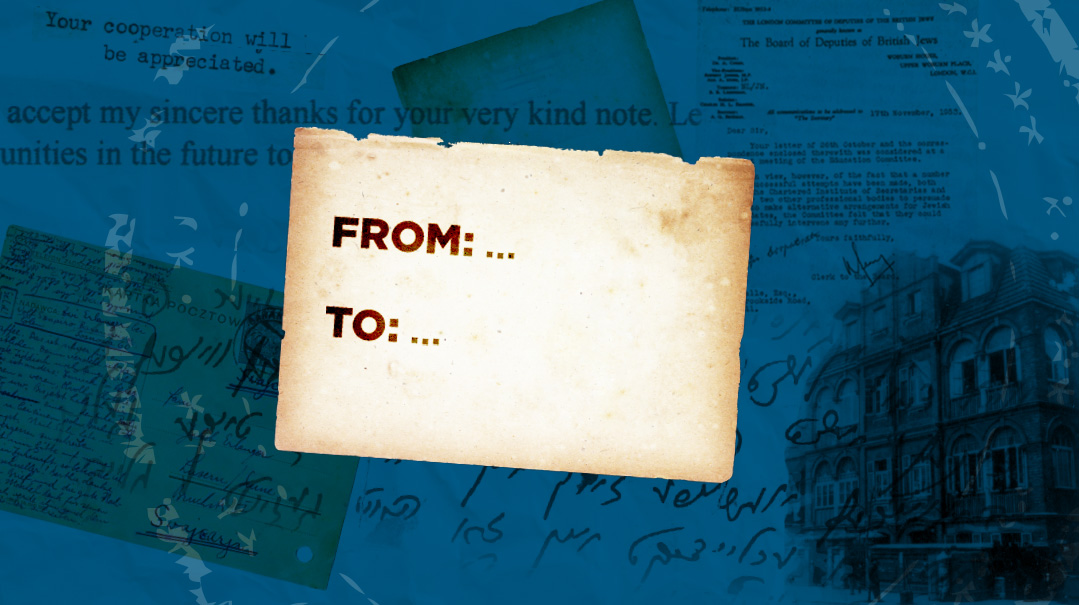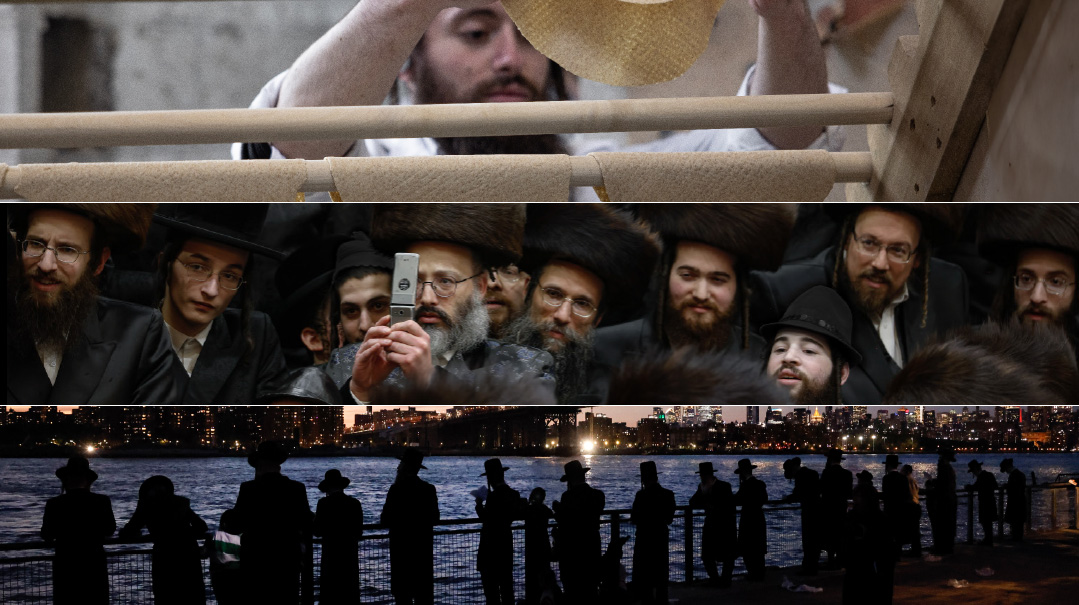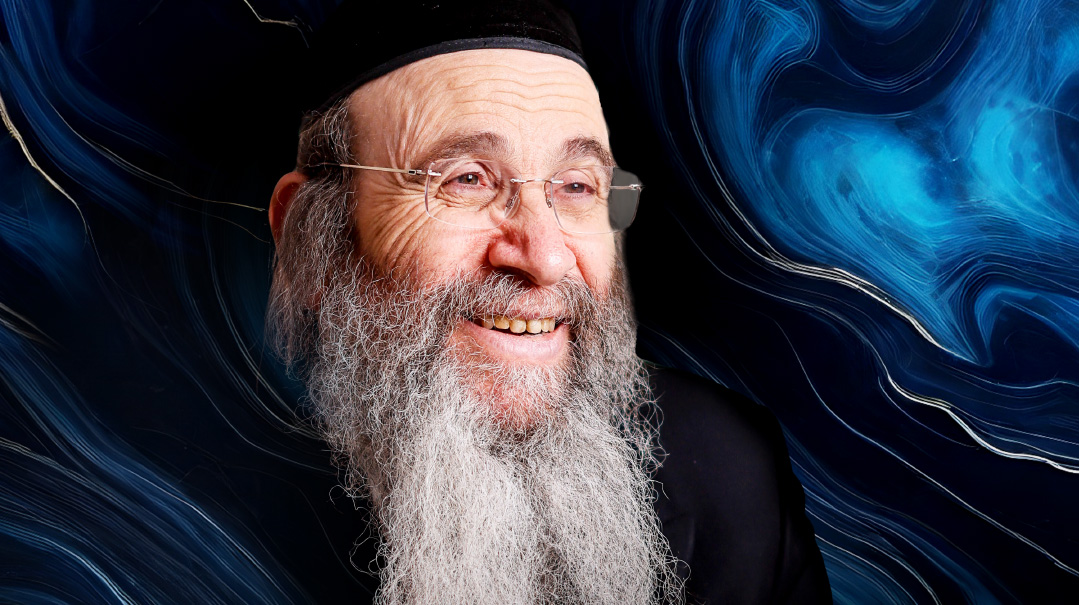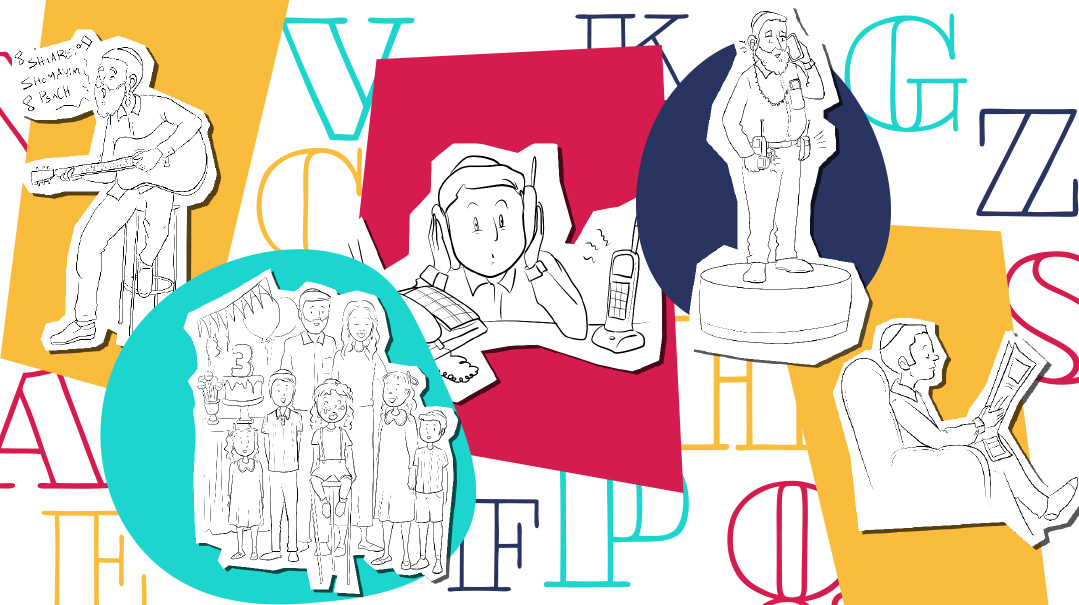The Navalny I Know

In an exclusive interview, Alexei Navalny’s longtime Jewish chief of staff, Leonid Volkov, opens a window to the man Vladimir Putin is most afraid of, and talks about his own teshuvah process by Navalny’s side
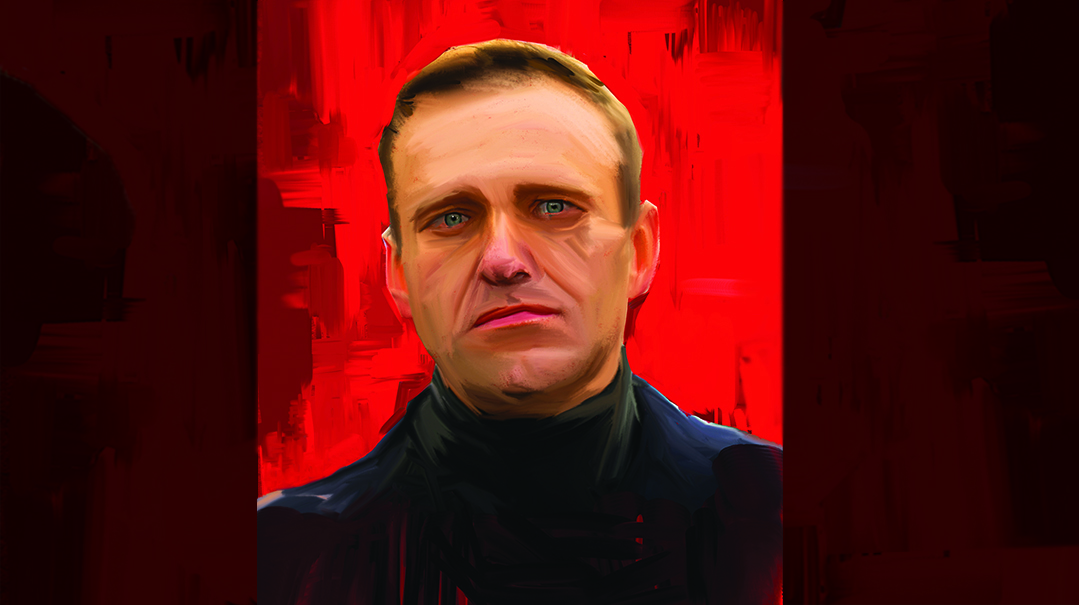
Russian opposition leader Alexei Navalny’s return to Moscow last week stunned the world. Just months after surviving a brazen assassination attempt at the hands of the security services, the anti-corruption campaigner flew back home from Berlin on a plane heaving with journalists, directly into the lion’s den.
It was no triumphal home coming. The founder of the “Russia of the Future” party, which has been repeatedly blocked from even registering as a political entity, was still gaunt as a result of his encounter with Novichok, the nerve agent that’s seemingly the weapon of choice for Russia’s official hit men. After his plane was diverted to an airport where a courtroom had been assembled, Navalny was sentenced to jail in a trial that he called “lawless.”
Two weeks after the event, as Western leaders urgently call for his release and thousands take to the streets inside Russia, the questions have only grown.
Cut off from the world in a maximum-security jail, the 44-year-old is at the mercy of a prison system where troublemakers have mysteriously met their end. What is his short-term survival strategy?
Even if his international stature protects him, how can Alexei Navalny’s cause prevail against the powerful security apparatus and governing elite who have closed ranks around leader Vladimir Putin?
Most disturbingly, is the Kremlin justified in claiming that the Yale-educated Navalny is a Western stooge whose human-rights platform remains unpopular with the average Russian, who admires Putin’s strong leadership?
In a candid interview from Vilnius, Lithuania, Navalny’s longtime Jewish chief of staff Leonid Volkov answers those questions and opens a window to one of the most dramatic stories of a drama-filled era.
In the fluent English of an IT entrepreneur, he talks about his own teshuvah process and career by Navalny’s side; the Kremlin attempts to smear Putin’s foe as anti-Semitic; what unites and divides the anti-corruption movement and Sharansky’s struggle, and the character of the man who’s dared to take on Russia’s ruler.
I’m speaking to you from Israel while you’re in what was called the “Jerusalem of Lita,” Vilna. Tell me a bit about yourself, how you got involved in Navalny’s movement and how you ended up living there.
I’ve been living here since August 2019, when I had to leave Russia because of political pressure. I’m 40 years old, born in Yekaterinburg (formerly Sverdlovsk), which is Russia’s fourth-largest city. I hold a PhD in computer science and was working as a CEO of one of Russia’s most successful tech companies when I got involved in local politics and met Navalny in 2010.
I was impressed that he wasn’t a normal Russian opposition figure, just releasing statements like “I am concerned by President Putin’s actions.” He was focused on the root cause of Russia’s problems, which is corruption.
So we started to work on projects together, and in 2013 he invited me to be his chief of staff in the Moscow mayoral election race. I’ve been working with him ever since.
Navalny has been a high-profile figure in Russia since the 2011 parliamentary elections, which he claimed were won by Putin’s United Russia party through mass fraud. But it wasn’t until the 2013 election that Navalny emerged as a major figure in Western eyes as well. How did that happen?
In 2013, there was a snap election for mayor of Moscow called by Sergey Sobyanin, the incumbent mayor. We had just three months to build a campaign infrastructure. Not only that, we had no access to newspapers and TV, which are mostly pro-Kremlin. Still, we managed to build an outreach infrastructure to Muscovites. We started with just 3% approval ratings, but at the end we took 30% of the vote, and the pro-Putin mayor barely escaped a runoff. It was a dramatic success.
A popular meme spread on the Russian Internet by Putin’s propagandists was that we liberals didn’t represent anyone, and that Putin’s approval rating was 86%. When the results of the election came in, though, the anti-Putin liberals took a third of the votes in Moscow, and the Kremlin realized that Alexei Navalny was a real threat.
So they invented criminal charges of embezzlement, and he received a suspended sentence, to prevent his name from ever appearing on a ballot.
That’s a savvy way to embarrass an anti-corruption campaigner. But why do you focus on corruption — is it because it’s something that all Russians can agree on, whereas regime change is not realistic?
No, it’s because corruption really is the root cause of what’s going on in Russia. It’s a complex problem that is part of Russian political history, but to keep it simple, corruption is the fundamental problem that’s responsible for all other problems.
Take, for example, the issue of bad infrastructure: Russia’s roads are not good, the houses are not built well — all that is rooted deeply in corruption. The people at the top steal billions of dollars that should be spent on these things and send them out of Russia for their own personal advancement.
And the reason we can’t stop this is because the courts are not independent. Corruption again. Or, in another example, the elections are rigged, as happened in 2011 — but you can’t get anywhere by taking it to court. There was open ballot-stuffing, but the courts rejected our appeals.
At this point, there are many people in Russia who share this assessment. They are realizing how deeply entrenched and problematic the corruption really is.
So it sounds like you’ve done a good job getting out the message. But if Navalny himself was banned from running for public office, how did he go on to make a national imprint?
By the 2018 presidential elections, we’d managed to build a national movement, consisting of offices in 40 major Russian cities from Kaliningrad to Vladivostok. That network is the reason why just two days ago, we had a nationwide rally calling for Navalny’s release, with crowds gathering in 140 cities. There was a total turnout of 300,000 people, which is very impressive for Russia.
The national movement is based on local branches, with each branch doing local activism and human rights work and competing in elections. They each have social media channels, and promote local causes.
And although our application to register as a party has been turned down by the Justice Ministry for no reason, we’ve been able to attack Putin’s power by tactical voting. In every local or regional election, we decided to support the best-placed candidate, no matter what their political affiliation. That way, we’ve managed to defeat United Russia in many areas.
In fact, when Navalny was poisoned last August, he was on the campaign trail in Siberia for regional elections.
Navalny himself is a source of fascination for Western media and audiences. Tell us what he’s like as a person, and what about his background led him to where he is today.
First of all, he’s a completely normal person. He enjoys a good meal, a good wine, just like anyone else. He loves his family and is a fitness enthusiast. But he’s a lawyer by education, which probably helped him to see injustice from the beginning. He also has a background similar to mine: We were both raised during the last years of the Soviet Union, when children were closely involved in politics.
The final years of Gorbachev and Yeltsin taught us to distinguish between the good and bad guys, and to read between the lines of the narrative of the new democratic Russia.
That said, Navalny had no political mentor — he’s completely self-made.
If he’s as you say — completely normal, a family man — what drives him to go back into the lion’s den after his brush with death. Isn’t he scared?
Russians today are living in an Orwellian society, where an enormous propaganda machine teaches people that two plus two equals five, and you have to be very brave to contradict this. So yes, he’s brave and confident. But he’s not someone who would risk his life for no reason. He’s not on a suicide mission.
He was poisoned and survived, and he proved that it was ordered by Putin, but now he’s recovered and his only crime is surviving. The day he woke up from his coma in Berlin, he decided to come back to his home. That’s where he belongs, and it’s normal to go home.
Home, yes, but normal? How can he be sure that nothing will happen to him again after they’ve tried assassinating him? And how can you be sure he’s holding up in prison?
We considered all scenarios before he boarded the flight, and he had a strong feeling that he was doing the right thing. But since he was arrested, he’s been cut off from the outside world. He’s in a special prison, with only irregular visits from lawyers, and no privacy allowed during these visits. The isolation is very unpleasant, but I’m sure he is dealing with the information vacuum with his usual courage.
In parallel with your political journey with Navalny, you also had a spiritual odyssey. In fact, the person who introduced us said that you got kosher meals when you went to prison. How did that come about?
That’s an interesting story, and it’s the story of 99% of former Soviet baalei teshuvah. Like most Jews born at the end of the Soviet era, I had no religious education at all, beyond some very basic stuff I’d read. My teshuvah started five years ago.
It began when my wife, who was not even Jewish, started to ask questions. “What does this mean? What is this concept?” It was quite random, because we had never discussed Yiddishkeit.
But then came Rosh Hashanah 2016, and I told her, “Let’s go to synagogue and buy some sweets for the festival.” When she asked me why, I tried to explain about the significance of the holiday — and realized that I didn’t know very much.
“Okay,” she said, “shouldn’t you study some more?”
That’s what brought her to giyur and then eventually to our halachic chuppah last year. By now our Judaism means a lot to our family.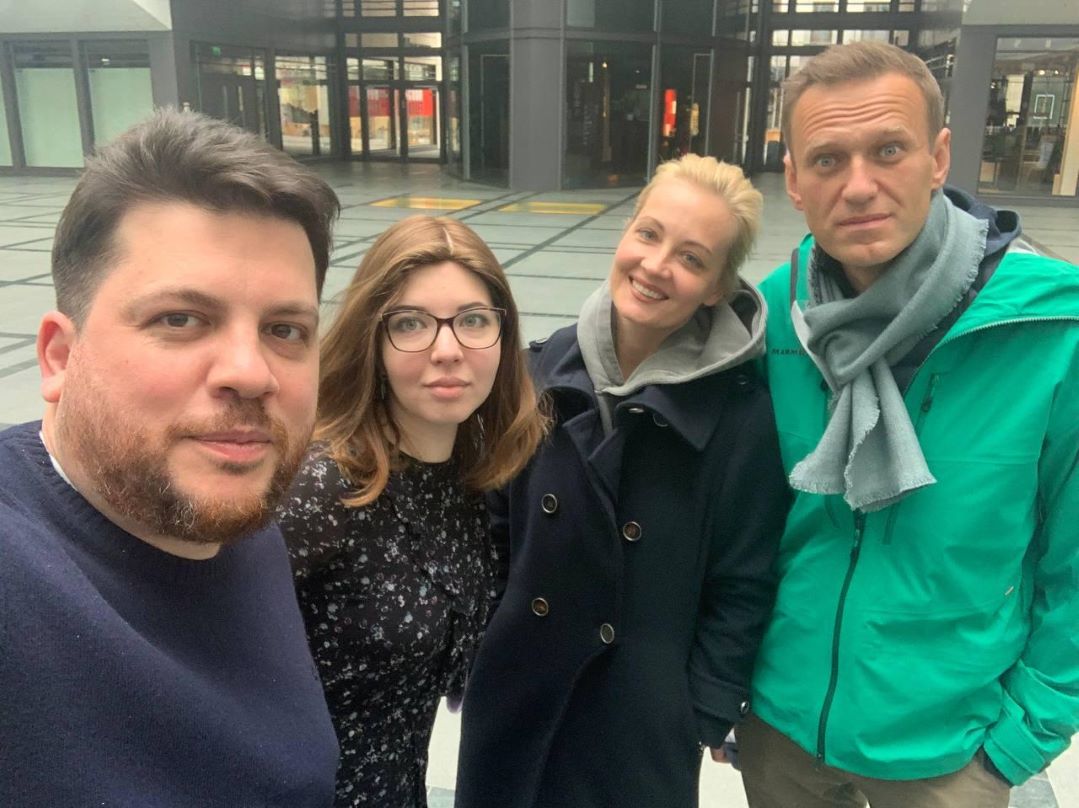
The Volkov and Navalny couples
With your Jewish perspective, what’s your take on the 2013 story that Navalny had “toasted the Holocaust,” in a report that was later shown to be a Kremlin smear?
The 2013 story you mention is an important one. It originated during the 2013 Moscow mayoral campaign. As you know, many Soviet Jews left the country to make aliyah or go to the US and Germany, so that electorally, Moscow’s Jews are insignificant. They number about 150,000 people out of 12 million, although many are wealthy and influential. But since Navalny was mostly addressing the liberal intelligentsia during his mayoral campaign, he got support from some of Moscow Jewry.
The Kremlin must have noticed that, because they made a very smart move, and “leaked” a story to a major Israel-based publication — an absurd story about Navalny making an anti-Semitic toast. It’s totally untrue; he is one of my closest personal friends, and was my Shabbos dinner guest many times. There’s no way he would have done that.
That paper then removed the article, but since then it’s been quoted many times, and in fact it taught the Kremlin propagandists something they didn’t anticipate. We’d always been targets of black PR inside Russia, and we know how to respond to it. But we didn’t expect that they would try to attack us from the back door, from abroad. When this lie was published in a respectable foreign outlet, the authorities were able to tell people, “See, they’re even saying this in the West.”
They now use that tactic for other issues, such as promoting a new ballistic missile to a domestic audience, by citing a small Western media outlet where they’ve planted the story.
Tell us what really happened when Navalny was poisoned. Did you think it was curtains for him, and has he changed as a result?
People around him were shocked by the poisoning, and he was closer to death than to life. For me personally, it was easier to regain my bearings than for millions of his supporters — I had no choice, because I immediately had to take charge of his medical evacuation to Berlin. But for many others, it was a shock.
Navalny himself definitely did change as a result: I would say he became an even better version of himself. Mainly, he’s become more sentimental. He knows he wouldn’t be able to do anything without his family supporting him. His wife, Yulia, is great, and believes in his work.
As a Jew taking on the Russian power structure, do you take inspiration from the dissidents and refuseniks of the Soviet era such as Natan Sharansky?
Of course we feel some connection, and I know a lot about their story. But the difference is that we’re not dissidents. They knew that they were a small minority, and so they had to keep all of their activities a secret. That’s not our case; we are a political movement that represents the silent majority.
How do we know this? Putin’s popularity is now below 50% in Russia. The last video we released a few days ago about Putin’s presidential palace got over 80 million views on YouTube — that’s half the Russian population. Last year our candidate was elected to the Novosibirsk council.
So followers of Navalny may not know they’re the majority because of successful propaganda, but it’s true.
Tell me about the life of a modern Russian revolutionary.
Well, until 2018, the life of Russian political activists was a regular middle-class life — we frequented restaurants (I only went to kosher restaurants, of which there are five or six) and enjoyed typical recreation. The average age of the original team is about 27 years old, and most of us were very well-educated, with some political experience, but were just normal modern humans.
But after the presidential campaign, the government increased pressure on our structures; they didn’t like our city network and hoped that we would disappear. Unfortunately, many of us were pushed out of the country. We got accustomed to jail stays along with drunk drivers, and detention centers, after many were detained at rallies.
I myself was detained nine times, arrested seven times, and spent 123 days in detention from 2017 to 2019. That’s why I’m here in Vilnius now.
So how, to use that Jewish phrase, do you make a parnassah?
My personal situation is not bad, because I was formerly a top IT executive and sold stock worth a couple of million dollars, so I still have some savings. I also still do IT consulting for private customers in Germany, Israel, and the US. It’s important for me to keep track of what’s going on in the tech world, for my role with Navalny.
But in general, our structure relies on crowd-funding. We have 26,000 supporters in Russia who give us seven to ten dollars a month, along with many other donors. Every time something dramatic happens, like Alexei getting arrested, we get donations. It’s funny, the government arrests us, but we are still diligent tax-payers.
With Navalny in jail again, are you not scared what might happen to him there, when people like Sergei Magnitsky met strange ends in prison?
In Russia anything can happen, but I can’t imagine that Putin would be so crazy as to order Navalny killed in prison. I think that their plan at this point is to lock him up for many years. His trial is scheduled for February 2, and that may lead to a three-year sentence. But then there will be new charges to keep him there for ten years. They have the tools to do that, and can invent as many new cases as they need.
Only a combination of domestic pressure — such as the large rally we’re planning for next week — plus international pressure will help. There’ll be a meeting of the European Council of Ministers to decide on the next step to deal with the case. And the new Biden administration has many Russia experts, like National Security Advisor Jake Sullivan and CIA head Nicholas Burns. We’ve received informal requests for information from sources in the new administration, but are sure that in a couple of weeks we will establish some formal connections.
Internationally, though, how much can you expect given the weak response of European leaders to massive violations of international law such as Russia’s invasion of Crimea, or the downing of an airliner over Ukraine?
It’s true that their responses haven’t been strong in the past, but we need to make the upsides for Putin to release Navalny outweigh the downsides — and here the West has many tools. Being “gravely concerned” isn’t one of them, but they have economic mechanisms.
Putin’s Russia is not North Korea, and all of his oligarchs and ministers have villas in London’s Mayfair and condos in Miami. Russian official data says that $60 billion is annually exported to the West. It’s stolen in Russia and invested in Europe and the American economy. So sanctions — such as freezing those assets — will have real teeth and can be effective.
So why have European leaders so far failed to pull these levers?
Putin is the king of Russian corruption, but he’s also good at exporting it. That’s also a threat to the West, because it rots their institutions. We did an investigation in which someone pretended to be a Russian minister and called British real estate agents who deal with high-end deals. He asked for help in parking money that could not be traced, and they said of course they could help him. So yes, expelling all Russian cash from the British economy could cost 0.5% of the British GDP, but the alternative is a blow to British values.
Bottom line, with Navalny in jail and an undeterred president, how do you see your movement succeeding against a powerful, loyal security state?
It’s a tough question, and we don’t see a clear scenario of success. But equally, there’s no clear scenario for Putin to prevail, because the economy and his approval rates are down.
It won’t be short or easy, but one scenario is that Putin’s elite becomes so unhappy with his leadership that they call for transition, and for dialogue between the Kremlin and the opposition, such as happened at the end of Franco’s dictatorship in Spain in the 1970s.
This would only happen if they see the downsides of having Putin as the supreme arbiter of their quarrels, and if the oligarchs have their assets frozen and their companies lose their market cap. If we get the cooperation to target the people around Putin, and make it clear that they lose more than they gain by supporting him, they’ll become unhappy with his leadership. That’s one scenario that we can see playing out.
In the final analysis, the West has to understand that it has a role to play and tools it can wield — but if they don’t use them, things will become dangerous for Alexei Navalny.
A Palace Fit for a Czar
“The Party of Crooks and Thieves.” Alexei Navalny’s description of the ruling United Russia party, uttered back in 2011, has since entered the Russian lexicon, becoming shorthand for the massive corruption of Putinist Russia.
In Navalny’s war against the country’s rulers, every exposé of high-level graft is another salvo of heavy artillery, tarnishing Putin’s image as Russia’s strongman father figure.
That’s why it was unsurprising that two days after Navalny’s arrest last week, his organization released another bombshell report, showing a Black Sea palace that they claim was built for Putin at state expense.
Against the background of a modern work space, a relaxed-looking Navalny tells the camera that the new palace — viewed by camera drone against the azure blue and white cliffs of the seashore — is not an opulent country-house, but “a modern Versailles.”
“It has its own harbor, guards, checkpoint, church, underground ice hockey rink, tunnel to a private beach, and no-fly zone,” he intones.
Besides the vastness of the four-sided mansion itself, built around a quadrangle, further evidence of gargantuan wealth is the size of its surrounding estate — nearly three times that of the nearest city.
Kremlin spokesman Dmitry Peskov denied the allegations that there was any connection between the estate and Putin, calling Navalny’s work a “sham investigation.”
The video — which has already garnered more than 86 million views — joins a whole cottage industry of “Putin reports” documenting personal wealth alleged to run into many tens of billions. But for Alexei Navalny, this report is not about wealth speculation, but a life’s work that has cost him his freedom.
(Originally featured in Mishpacha, Issue 846)
Oops! We could not locate your form.








